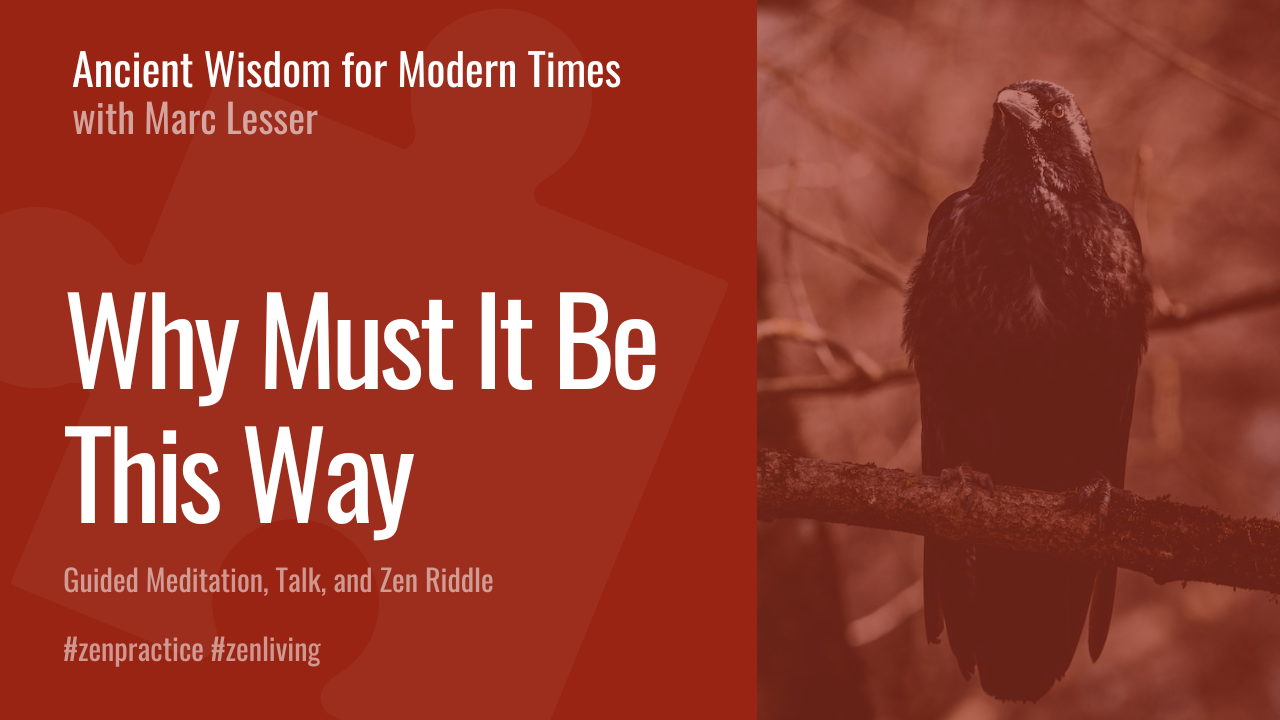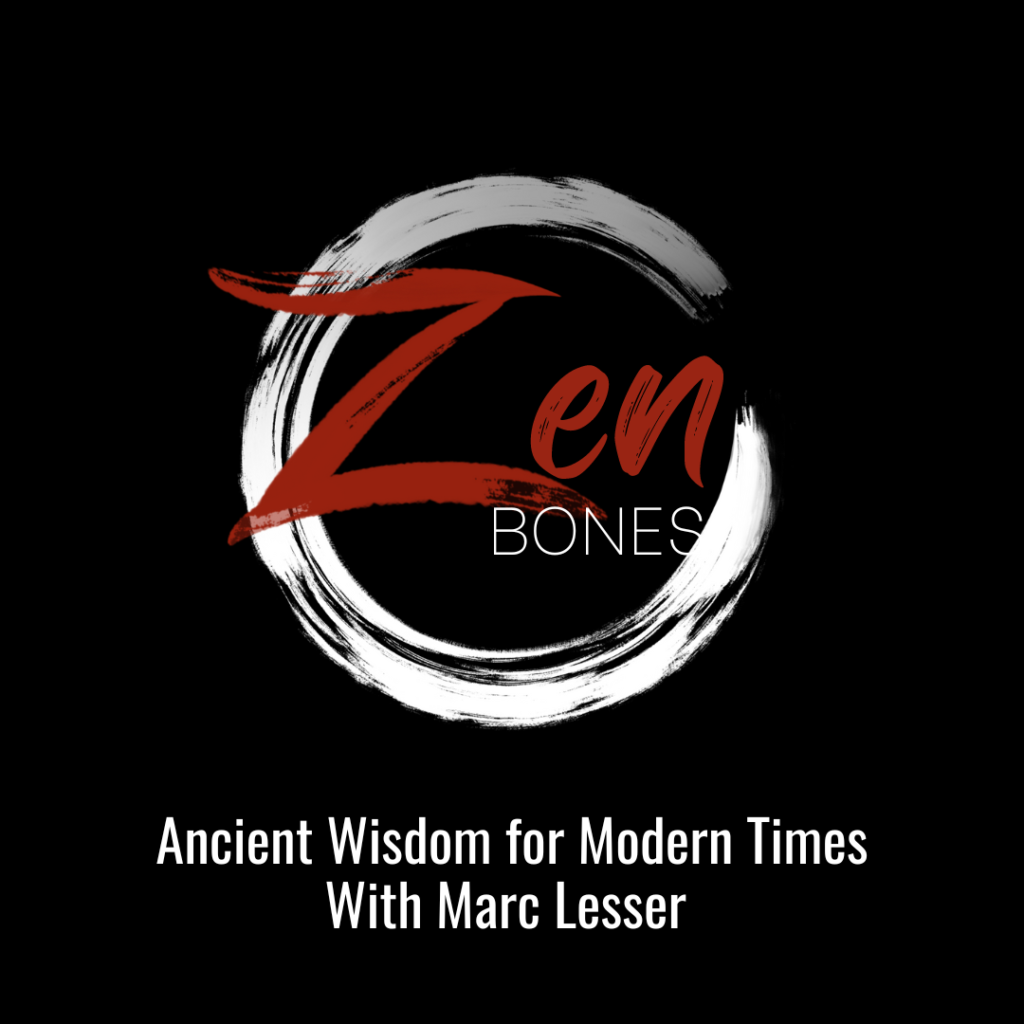In this episode we begin with a short guided meditation. Then, Marc gives a short talk based on a famous Zen dialogue in which a student asks, “Why must it be this way?” when he sees a crow eating a dead frog. The Zen teacher responds “It’s for your benefit. And you caused it.” Marc address and unpacks this mysterious and practical dialogue that is meant to open our hearts and minds. For this episode’s Zen Puzzler, Marc plays with the question, “What is Zen?” and goes deeper into the question of why things must be a particular way.
EPISODE TRANSCRIPT
[music]
Marc Lesser: Welcome to Zen Bones. Ancient wisdom for modern times. This is Marc Lesser. Why Zen Bones? Our world is in crisis and ever-shifting, and now more than ever, more wisdom, clarity, and courage are essential. Especially in the world of work, business, and leadership.
In today’s episode, we begin with a short guided meditation, just a few minutes of stopping, pausing, and going deeper. Then I talk about a famous Zen dialogue in which the student asks, why must it be this way? Referring to a crow eating a dead frog, and the Zen teacher responds, “It’s for your benefit and you caused it.” Together we address and unpack this mysterious and practical dialogue meant to open our hearts and minds, broaden our worlds.
Then today’s Zen puzzler, we address this question of why must it be this way and also unpack a bit the question that is parallel which is what is Zen or what does it mean to be a human being? What does it mean to be alive and live in this world of earth and life and death. I hope you enjoy today’s episode. [music] Let’s begin with a short meditation and I’m going to ring my trustee bell.
[bell ringing]
Marc: We hit the bell. The bell I think helps with the transition, reminding us that there’s a difference between our ordinary lives and stopping, pausing. Can you feel it? Can you feel right now the transition, [silence] from ordinary space to the space of entering the space of a different kind of curiosity, awareness, bringing awareness to whatever’s happening with the body, bringing awareness to whatever’s happening with your breathing right now, and noticing our thoughts, our thinking minds, how curious that we can do that, that we can bring attention to the body, that we can bring attention to the breath, that we can be curious.
Is our thinking mind busy, judgmental, or is it calm and curious, and noticing any feelings? How are you showing up right now? How are you showing up right now? What are you bringing to this moment? As much as possible shedding the activities and to-do lists, putting those aside and just being here. Here in this both ordinary but also extraordinary space here alive, seeing if it’s possible to bring a warmhearted quality, warmhearted even in the midst of the challenges, the difficulties, the grieving, the joy, while all enveloped in this sense of appreciating whatever is happening right now.
[silence] Keeping it simple while breathing in and breathing out without doing anything extra. What is it like? Take some attention and some courage to enter this space of not doing anything extra, not distracting ourselves, really noticing, sometimes this is called our big mind, the mind that can hold everything, not pushing anything away, not grasping onto anything, while ordinary and extraordinary at the same time.
[pause 00:07:03]
Marc: I’m going to ring the bell to finish here, but please feel free to pause and keep sitting or we’ll move on to whatever happens next.
[bell ringing]
[music]
Marc: Why must it be this way? I think this is such a great question. Why must it be this way? Question for leaders, for mindful leadership, and for anyone here alive right now. It leads me to think about how might things be different? How might I benefit from everything around us? What is it like to be alive? What are the wonderful things that can happen in our lives as well as the challenges, painful things? Why is it this way? This question actually comes from a very old dialogue, a Zen dialogue from sixth century China, in which a student, a Zen student comes upon a crow that is eating a dead frog and he asks a great Zen teacher Dongshan.
Why must it be this way? Dongshan responds I think with just a surprising and powerful answer. Dongshan says, “It’s for your benefit and you caused it. It’s for your benefit and you caused it.” That, of course, is not the answer that we might expect. What is it? What is it about Dongshan’s words? Of course, this image of a crow eating a frog is a powerful image and can conjure up pain and frustration and any difficulties that we’re experiencing in our lives and we might say, “Why?” Why is everything so difficult? Why is everything is so challenging? Why do things look painful and unfair? Why are we so divided on key issues? Why aren’t we caring for our planet? How can we live with so much uncertainty?
Dongshan words it’s for your benefit might seem like a cruel joke, and yet it’s really about perspective, stepping back. Yes. while our world is filled with pain and challenges, it’s also filled with unbelievable beauty, loving hearts, and goodness all mixed together in a most amazing and mysterious way. The frustrating and the painful blended with all that is beautiful and moving, and clearly, it is all for our benefit.
In this case, if all the good and bad around us is really for our benefit, consider how might we work on this. How might we look at the way that we are thinking about embodying, and feeling our approach to ourselves, to our work, to our relationships, and to the world? It’s easy to feel that somehow the world is operating against us. It’s this phrase, it’s for your benefit is a whole sense of empowerment, a whole sense of radical, radical empowerment, radical agency. The second part of this is you caused it. Clearly, this is a way of radical responsibility for how we are seeing and approaching and living in the world. I love to say that there are events and then there’s how we interpret and relate to these events.
We are responsible for how we see the world for our actions and our relationship with our family, our work, our community, and our planet.
Saying you cost it doesn’t mean it’s not your fault. I love the distinction between it’s not your fault, it’s not our fault, but it’s our responsibility. How can we take responsibility for living the best life that we can? How can we take responsibility for how we see and swim in the world? How can we shift from the habit energy to the deeper vow of living with awareness and the vow of helping in every way that we can? Here’s a poem that I think is a way of highlighting this sense of why must it be this way and it’s for our benefit. This is a poem called Sometimes by Sheenagh Pugh.
Sometimes things don’t go, after all from bad to worse.
Some years, muscadel faces down frost;
green thrives, and the crops don’t fail.
Sometimes a man aims high, and all goes well.
A people sometimes will step back from war,
elect an honest man, and decide they care enough,
that they can’t leave some stranger poor.
Some men become what they were born for.
Sometimes our best efforts do not go amiss,
sometimes we do as we meant to.
The sun will sometimes melt a field of sorrow
that seemed hard frozen: may it happen for you.
The sun will sometimes melt a field of sorrow that seemed hard frozen. May it happen for you? Why must it be this way? Why and how can we open our hearts and minds to living our best full selves? People sometimes will step back from war, elect an honest man, decide they care enough that they can’t leave some stranger poor.
[music]
Marc: Welcome to the Zen Bones Puzzler, where I will regularly be presenting a story or a Zen cone or a poem, something to contemplate, to think about a story that has purpose. It’s about developing greater insight and reflection, not so much for a solution, but as a way to support your practice, a meditation in daily life. Today’s Zen puzzler. I love bringing forward these interesting mysterious Zen question Zen poems. Again, I think just the word Zen is a puzzler. To me, the word Zen itself, I think, literally, it means to sit. It’s about the practice of sitting, sitting practice.
Deeper than that, I think the word Zen is a placeholder for what does it mean to be human? I was once at an event at Tassajara, the San Francisco Zen Center Monastery in the Los Padres Forest wilderness and Central California. It was an event where there were families there in the summertime. There was a 10-year-old boy who turned to his father, who was visiting Tassajara I think for the first time. The 10-year-old said, “Dad, what is Zen?” The father turned to me and I said, “What? Why don’t you have your son ask all of the Zen students here this question?” He did. He went around for the next couple of days and asked people what is Zen and wrote down their answers.
Then the following evening after dinner, a bell was rung. The father said he had an announcement to make, and his 10-year-old son stood up and read the I think it was 20 or 30 answers that he had gotten. Of course, they were all very distinct answers to this question. What is Zen? Essentially they were all about Zen, Zen is being fully here. Zen is developing your radical self-awareness. Zen is the practice of warm heartedness. Zen is a non-dual practice of cutting through right and wrong.
Now, onto our puzzler for today, which is really the question, this dialogue that I talked about earlier in this episode of a Zen student coming, coming across a crow, eating a dead frog, and asking and wondering why must it be this way? In some way, this question, why must it be this way? Is it a lot like the question of what is Zen? What is up with reality? What is up with my experience? Why this harshness of life and death? Zen is really about an exploration about our birth, our lives, and our death. Why do we practice and how do we practice within this, the mystery of that we’re born, we live and we die.
Again, I think this is the student coming across birth and life and death in seeing a dead frog encountering it. I think Dongshan who is the founder of Soto Zen in China in the sixth century response, “it’s for your benefit and you caused it”, this response is worth staying with. I would suggest during meditation or during the day in meetings, in conversations anytime we find that we are wavering or feeling our inner grump or our inner victim or the gaps between what we want, what we aspire and what we see, this phrase, this it’s for your benefit and you caused it. It’s for your benefit and you caused it.
I think the underlying sentiment here is that everything is for our benefit, from the air that we breathe, the sunlight shining on the trees, the clouds, it’s all gift, it’s all completely gift. If we can embody that and feel how spectacular, amazing that is when we are able to feel that and the you caused it or it’s really your– again, not that it’s our fault, but that we have the ability to completely enter the courage it takes to not grasp on or push away, but to see what is to see. I love the statement by Shunryu Suzuki I think it’s in the opening talk of his book, Zen Mind, Beginner’s Mind, where he says, if you think that when you die, this is the end of your life, this is not right understanding.
Then he says, if you think when you die this isn’t the end of your life, this also is not the right understanding, that he’s saying birth and life and death are for our benefit and we caused it in some way or we make it what it is and that we have the deep responsibility to cultivate our own depth, our own understanding of our lives, of birth and life and death, so why must it be this way? I hope you can bring this question and this sentiment into every aspect of your lives, it’s for your benefit. Thank you.
[music]
Marc: Listen in each week for interviews, teachings and guided meditations. You’ll receive supportive tools for creating more meaningful work and mindfulness practices to develop yourself, to influence your organization and to help change the world. Thank you for listening.
[00:24:37] [END OF AUDIO]









